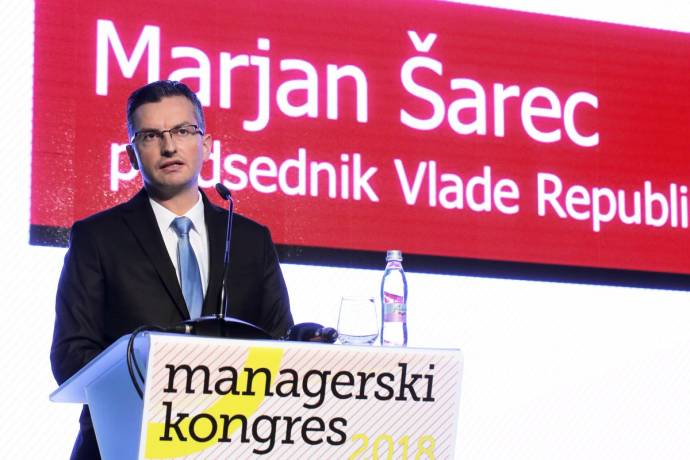Referring to the upset caused by plans set down in the coalition agreement to tax capital gains as personal income tax, Šarec pledged to seek dialogue on all decisions, including in tax policy.
"If we raise a single tax or if we reduce another, we haven't done anything, we've disrupted the system," he told the Manager Association's conference, which started on Thursday.
He believes the task ahead will be hard - finding suitable solutions through dialogue. "Any decision will have to mature in dialogue, with you and other social partners, so that we get to a solution that not everyone will be pleased with but that will make it possible to live and work with."
"We promise to talk all the measures through with you before we implement them," Economy Minister Zdravko Počivalšek said.
Aleksander Zalaznik, the chair of the Managers Association, warned in his address that business should not be exposed to shocks which could reduce ambitions or profits.
He said that profits, which only a few years ago were much lower, must remain in companies as the fuel of development, and, above all, as a motivation for those who were prepared to take more risk and responsibility.
"Without successful entrepreneurs there will be no successful Slovenia, which is why I don't think it's fair that we should be talking about increasing profit tax," Zalaznik said.
Fuel for success of businesses is the central theme of the meeting. "We in business want prosperity and welfare state too," Zalaznik said, adding that the way to achieve that was not higher taxes, but "growth, more jobs and higher value added".
Zalaznik called for cooperation, as did Saša Mrak, the executive director of the Manager Association, who said that Slovenia ranked among the bottom ten countries by business-government relations.
She said that Slovenia was short of human capital for growth and development and that progress was being clogged by structural and cultural factors, including the capacity to cooperate.
The two-day conference was also addressed by Paul Evans, the academic director of the INSEAD Global Talent Competitiveness Index, who presented the results of the talent competitiveness survey.
Slovenia ranks 28th overall among the 129 countries in the index, but places only 96th in brain gain, that is capacity to attract talented staff from abroad.
"We need to manage human capital, which is no longer in abundance, much more carefully than financial capital, which we still have a lot at our disposal for now," Mrak said, adding that the challenge was how to turn brain drain into brain circulation.
One of the topics of the conference is productivity, which data from the Institute of Macroeconomic Analysis and Development (IMAD) shows is 20% below EU average in Slovenia.
Zalaznik would like for Slovenia to raise productivity and value added, which IMAD director Boštjan Vasle said was key for Slovenia's development drive, along with adjustment to demographic change.
The conference will continue tomorrow with lectures on digital transformation by Slovenian and foreign experts.
The Manager Association also presented the Manager of the Year award to Boštjan Gorjup, the CEO of the Slovenian subsidiary of BSH, while food company Kolinska will be honoured for its attitude to diversity and balance.







